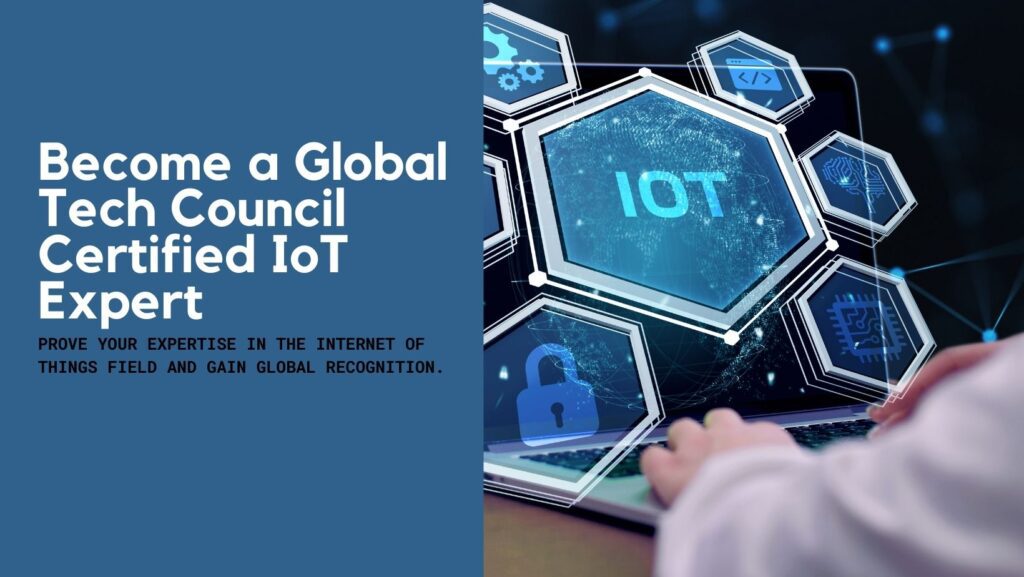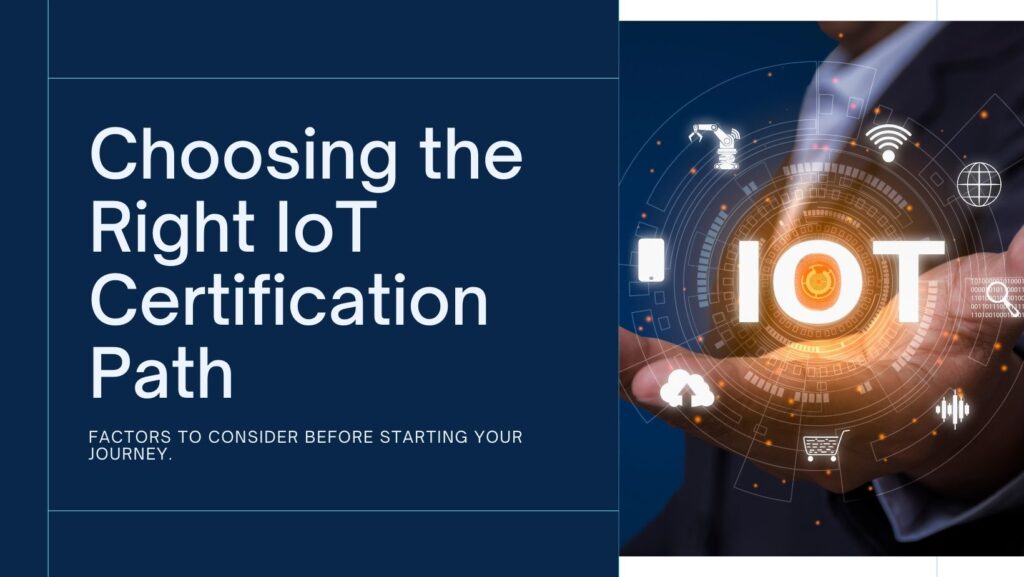Introduction:
In our ever-evolving digital landscape, the Internet of Things (IoT) stands at the forefront, reshaping how we interact with technology. To embark on a successful career in this dynamic field, obtaining the right certifications is crucial. In this blog, we’ll explore the top 5 certifications that can pave the way for a prosperous career in IoT. Whether you’re starting your journey or aiming to enhance your expertise, these certifications equip you with the skills needed to navigate the complexities of IoT, opening doors to exciting opportunities in a connected world. Let’s dive into the world of IoT certifications and unlock the gateway to a thriving career!
1. CCC Internet Of Things Foundation Certification:
Introduction to CCC Internet of Things Foundation Certification:
The CCC Internet of Things (IoT) Foundation Certification serves as a foundational stepping stone for individuals looking to understand the core concepts of IoT. This certification is designed to provide a solid introduction to the world of IoT, helping learners grasp the fundamental principles that underpin this transformative technology.
Key Concepts Covered:
The certification curriculum covers key concepts essential for navigating the IoT landscape. Learners gain insights into IoT architectures, technologies, and the practical applications of IoT across different industries. By focusing on these core concepts, the certification ensures that individuals develop a well-rounded understanding of how IoT works and its potential impact on various sectors.
Benefits and Impact:
Earning the CCC IoT Foundation Certification brings several benefits. It equips individuals with the knowledge needed to engage in IoT projects with confidence. The certification is particularly valuable for those seeking a foundational understanding of IoT, making it an ideal starting point for professionals entering the field. With its emphasis on practical knowledge, the CCC IoT Foundation Certification prepares learners to contribute effectively to IoT initiatives in real-world scenarios.
2. CertNexus Certified Internet Of Things Practitioner:
a) Understanding the CIoTP Certification:
The CIoTP certification is designed to provide a comprehensive understanding of IoT concepts, technologies, and applications. It covers essential topics such as IoT architecture, data management, connectivity protocols, and security considerations. Through a blend of theoretical knowledge and practical insights, candidates gain proficiency in developing IoT solutions that address real-world challenges across diverse industries.
b) Key Areas of Focus:
The CIoTP certification curriculum encompasses several key areas essential for IoT practitioners:
-
- IoT Fundamentals: Gain insights into the foundational principles of IoT, including its history, evolution, and ecosystem components.
-
- IoT Architecture: Explore different IoT architecture models, deployment scenarios, and scalability considerations.
-
- Data Management: Learn strategies for collecting, processing, and analyzing IoT data to derive actionable insights and drive informed decision-making.
-
- Connectivity Protocols: Understand various communication protocols used in IoT deployments, such as MQTT, CoAP, and HTTP, and their respective strengths and limitations.
-
- Security and Privacy: Delve into IoT security best practices, including device authentication, data encryption, and vulnerability management, to mitigate cybersecurity risks and safeguard sensitive information.
c) Benefits of CIoTP Certification:
Earning the CIoTP certification offers numerous benefits for professionals looking to excel in the IoT domain:
d) Validation of Expertise:
The CIoTP certification validates proficiency in IoT fundamentals and demonstrates a candidate’s ability to design and implement IoT solutions effectively.
e) Career Advancement:
CIoTP-certified professionals are equipped with the skills and knowledge sought after by employers across various industries, opening doors to exciting career opportunities and advancement prospects.
f) Industry Recognition:
CertNexus certifications are globally recognized and accredited, enhancing the credibility and marketability of CIoTP-certified professionals in the job market.
g) Continuous Learning:
The CIoTP certification provides a solid foundation for continuous learning and professional development in the rapidly evolving field of IoT, enabling practitioners to stay abreast of emerging trends and technologies.
3. Microsoft Certified Azure IoT Developer:

Introduction:
The Microsoft Certified Azure IoT Developer certification is your gateway to mastering the world of Internet of Things (IoT) solutions using Microsoft’s powerful Azure platform. This certification is tailored for individuals keen on building and deploying innovative IoT applications, leveraging the robust features and services offered by Azure. Let’s explore what makes this certification stand out in the realm of IoT development.
Comprehensive Curriculum:
The certification’s curriculum delves deep into the essentials of developing IoT solutions on Azure. It covers a spectrum of topics, including device-to-cloud and cloud-to-device communication, security implementation, and data storage and processing. The course ensures that candidates gain practical insights into creating scalable and efficient IoT applications using Azure services, making them proficient Azure IoT Developers.
Hands-On Experience:
One standout feature of this certification is the emphasis on hands-on experience. Candidates not only grasp theoretical concepts but also get the chance to apply their knowledge through practical exercises. This approach ensures that Azure IoT Developers are not just well-versed in theory but are also equipped to tackle real-world challenges, making them valuable assets in the rapidly evolving field of IoT.
4. Arcitura Certified IoT Architect:
Comprehensive Architectural Understanding:
Arcitura’s certification ensures a thorough comprehension of IoT architecture principles. From the fundamental building blocks to intricate scalability considerations, the program covers it all. In simple terms, it equips individuals with the knowledge to create IoT structures that seamlessly connect devices, manage data effectively, and maintain security, laying a strong foundation for successful IoT implementations.
Scalability and Security Focus:
One standout feature of this certification is its emphasis on scalability and security. In easy-to-understand language, the program teaches architects how to design IoT solutions that can grow with evolving demands while safeguarding sensitive data. This dual focus on scalability and security is crucial in today’s dynamic IoT landscape, ensuring that certified architects can meet the challenges of tomorrow’s interconnected world.
Practical Application of IoT Concepts:
The Arcitura Certified IoT Architect program goes beyond theory, encouraging hands-on learning and practical application of IoT concepts. By using relatable examples and real-world scenarios, the certification equips architects to translate their knowledge into actionable solutions. This practical approach ensures that certified professionals not only understand the theoretical aspects but also possess the skills to tackle real challenges in the field of IoT architecture.
5. Global Tech Council Certified IoT Expert:

A. Introduction:
The Global Tech Council Certified IoT Expert certification is a prestigious credential designed to equip professionals with advanced expertise in the Internet of Things (IoT). This certification program covers a broad spectrum of IoT domains, empowering individuals to lead strategic IoT initiatives, drive innovation, and tackle complex challenges in today’s interconnected world.
B. Program Overview:
The Global Tech Council Certified IoT Expert certification program offers a comprehensive curriculum that delves into various aspects of IoT technology, strategy, and implementation. Participants gain in-depth knowledge of IoT architectures, protocols, security, data analytics, and emerging trends. Through a blend of theoretical learning and practical exercises, candidates develop the skills needed to design, deploy, and manage scalable and secure IoT solutions.
C. Curriculum Highlights:
The certification curriculum encompasses key IoT concepts and technologies, including:
1. IoT Fundamentals:
Understanding the principles and components of IoT ecosystems, including sensors, actuators, connectivity protocols, and edge computing.
2. IoT Architecture:
Designing robust and scalable IoT architectures, considering factors such as interoperability, data management, and system integration.
3. IoT Security:
Implementing security measures to protect IoT devices, networks, and data from cyber threats, vulnerabilities, and breaches.
4. Data Analytics:
Leveraging data analytics techniques to derive insights, optimize performance, and drive informed decision-making in IoT applications.
D. Career Opportunities:
Upon achieving the Global Tech Council Certified IoT Expert certification, professionals unlock a myriad of career opportunities in the rapidly expanding field of IoT. Graduates may pursue roles such as:
1. IoT Solutions Architect:
Designing end-to-end IoT solutions tailored to organizational needs, balancing functionality, scalability, and security.
2. IoT Consultant:
Providing strategic guidance and technical expertise to businesses seeking to leverage IoT for digital transformation, innovation, and competitive advantage.
3. IoT Project Manager:
Overseeing the planning, execution, and delivery of IoT projects, ensuring alignment with objectives, timelines, and budget constraints.
4. IoT Entrepreneur:
Entrepreneurial-minded individuals may leverage their certification to launch startups or ventures focused on developing innovative IoT products, services, or platforms.
Factors to Consider When Choosing an IoT Certification Path:

When selecting an IoT certification path, several factors warrant consideration:
Industry Relevance:
Choose a certification that aligns with your career goals and the industries you’re interested in, ensuring its relevance in your desired job market.
Curriculum Depth:
Assess the depth and breadth of the certification curriculum to ensure it covers essential IoT concepts, technologies, and best practices comprehensively.
Accreditation and Recognition:
Opt for certifications from reputable organizations with industry recognition, ensuring the certification holds value in the job market.
Exploring Career Opportunities After Getting Certified in IoT:
IoT Certifications opens doors to a wide range of career opportunities across various industries, including:
IoT Developer:
Develop and deploy IoT solutions, leveraging programming languages, cloud platforms, and IoT frameworks.
IoT Architect:
Design and implement scalable and secure IoT architectures, considering factors such as connectivity, data management, and interoperability.
IoT Consultant:
Provide strategic guidance and technical expertise to organizations seeking to adopt or optimize IoT solutions, addressing challenges and maximizing opportunities.
IoT Project Manager:
Oversee the planning, execution, and delivery of IoT projects, ensuring adherence to timelines, budgets, and quality standards.